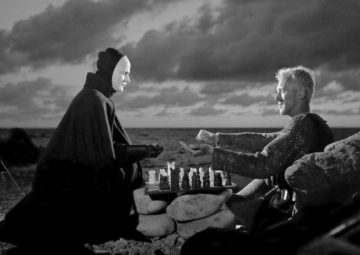Kathryn Davis in The Paris Review:
 We’re in a room on the ground floor of a hotel, the bed facing a wall of curtained windows that in turn faces the street. It is nighttime. Rain is coming down, steadily, reflectively, a stream of passersby visible through the curtains, which are sheer. Everyone is moving in the same direction, bent slightly forward and holding an umbrella, from left to right, the good direction, from past to future, the opposite of where Death leads the knight and the squire and the monk and the smith and the mute in their final dance against the backdrop of time in Ingmar Bergman’s The Seventh Seal. The umbrella is the canopy of the heavens; the rain is never going to let up. We can see the passersby but they can’t see us, though Eric has turned a light on above his side of the bed.
We’re in a room on the ground floor of a hotel, the bed facing a wall of curtained windows that in turn faces the street. It is nighttime. Rain is coming down, steadily, reflectively, a stream of passersby visible through the curtains, which are sheer. Everyone is moving in the same direction, bent slightly forward and holding an umbrella, from left to right, the good direction, from past to future, the opposite of where Death leads the knight and the squire and the monk and the smith and the mute in their final dance against the backdrop of time in Ingmar Bergman’s The Seventh Seal. The umbrella is the canopy of the heavens; the rain is never going to let up. We can see the passersby but they can’t see us, though Eric has turned a light on above his side of the bed.
I was obsessed with The Seventh Seal my senior year in high school; I was obsessed with the vision it presented of a handsome knight playing a game of chess with Death. Death’s face was unexpectedly round and white, the blackness of his eyes and their sparkling avidity as terrifying as the sound of his name in Swedish. Döden. There could be no doubt of the fact that death at the end of it elevated life—an otherwise lackluster affair in which human beings were obliged to eat and mate and have jobs and engage in pointless conversation—into a realm worthy of passionate attachment.
More here.
